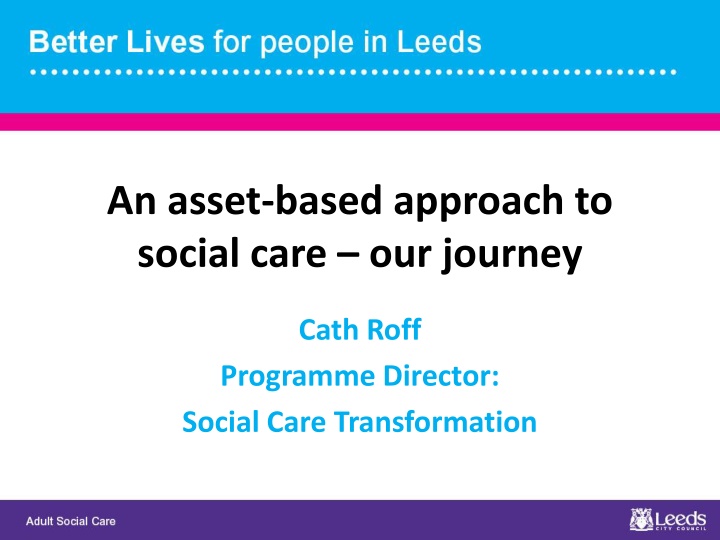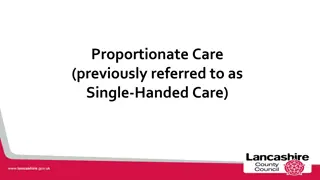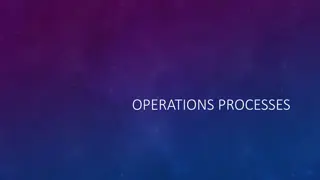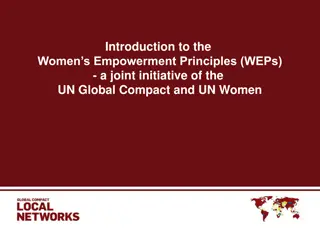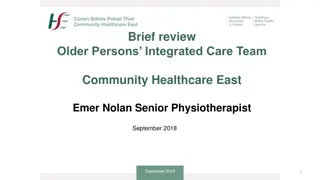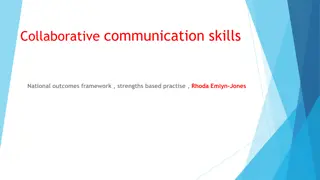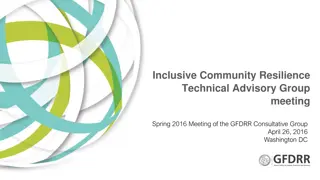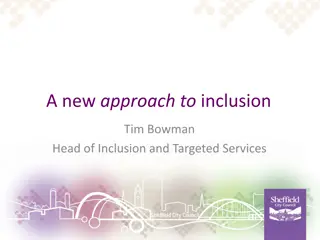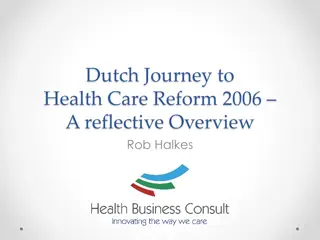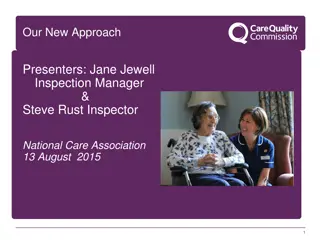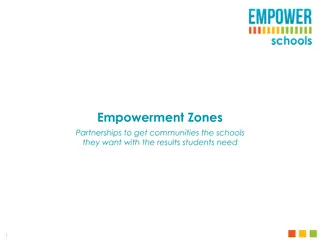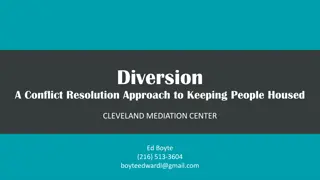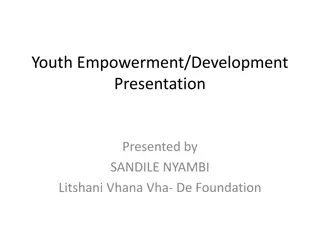Transforming Social Care Through Strengths-Based Approach and Community Empowerment
Embracing a strengths-based approach to social care, Cath Roff led a transformative journey in Leeds by empowering social workers and engaging communities. This shift involved changing conversations, focusing on individual strengths, enhancing community capacity, and reducing bureaucracy in service delivery. By trusting in social workers' expertise, a compassionate and economically strong city evolved, challenging traditional social care models and promoting a more inclusive and effective system.
Download Presentation

Please find below an Image/Link to download the presentation.
The content on the website is provided AS IS for your information and personal use only. It may not be sold, licensed, or shared on other websites without obtaining consent from the author.If you encounter any issues during the download, it is possible that the publisher has removed the file from their server.
You are allowed to download the files provided on this website for personal or commercial use, subject to the condition that they are used lawfully. All files are the property of their respective owners.
The content on the website is provided AS IS for your information and personal use only. It may not be sold, licensed, or shared on other websites without obtaining consent from the author.
E N D
Presentation Transcript
An asset-based approach to social care our journey Cath Roff Programme Director: Social Care Transformation
Content 1. Strengths-based social work 2. Asset-based Community Development 3. Commissioning especially home care
Context April 2015 started in Leeds as Director of Adult Social Care Coincided with Care Act 2014 coming into being What did a strengths-based approach in social care mean especially for social work? What was it like to be a social worker in Leeds?
What did I find? A strong city history of asset-based approaches A council with an ambition to be a compassionate city with a strong economy Social workers frustrated by bureaucracy Onerous processes for accessing direct payments An organisational structure that wasn t working Ever increasing squeeze on budgets
Two choices Manage the pressure on budgets by ever increasing tightening of the interpretation of eligibility criteria Social workers become the border patrol Turns citizens into the haves or have nots Do something fundamentally different!
A leap of faith Made a commitment to liberate social work Told my social workers I trusted them and their professional practice I trusted them to apply common sense in making the changes we needed This was going to be a transformation led by them
The Rule of Three Don t break the law Don t blow the budget Do no harm .Otherwise go for it!
Better Conversations Strengths-based approach to social care started with social work Changing the conversation throughout the customer journey Starting point is: from What is the matter with you? to What matters to you? Building on individual, family and community strengths Getting out of the office into the community Creating capacity to focus on people with more complex needs Reducing bureaucracy wherever possible
So what did we do? Made fundamental changes in the language we used to talk to citizens Changed how we operated our front door Trialled a new Rapid Response team concept Set up an innovation pilot in our Armley Neighbourhood Team Developed a community presence: Talking Points Changed our paperwork
Reducing bureaucracy Reduced the 27 page Guided Self Assessment form to the 2 page Conversation Record Supported by new practice guidance Revised review form Revised transfer form All designed by front line staff All Care Act compliant
What were the outcomes? More efficient and effective front door Eliminated waiting lists once introduced Rapid Response Average time to see a social worker reduced from 21 to 8 days Customers like the new approach Social workers rediscovered their community Made better use of community resources to support people s aspirations Significant reduction in the number of older people admitted into long term care Positive impact on GP workloads Better inter-agency and inter-disciplinary working Liberated social workers proud of their practice
Proliferation It happened spontaneously Word-of-mouth Peer-to-peer seminars Rolled out two more Rapid Response teams 17 Talking Points across the city Learning disabilities Phase one programme has focussed on people going through transition Embraced by the Hospital Social Work team Adult Mental Health and Forensic Teams
Customer & Carer feedback The package lets me get on with my life knowing that my daughter s needs are met well. Never thought I would have this level of freedom I walked away feeling that a weight had been lifted They really listened to me We don t know what we would have done without you Because of the conversations that were had, everything went really smoothly with the emergency move The Rapid response service has been excellent
Staff feedback As we look at the strength-based model, being encouraged to be creative with service provision as really brought a fresh feel to the social work role We can see positive results for the service users and it adds to us feeling valued as workers: what could be better! People don t have to wait more than a few days for an appointment so we can offer a far more responsive service & manage crises better Engaging with the local community centre has opened a lot of doors to the team being able to put faces to names and network in the local area Utilising the Conversation Record allowed a very open & candid conversation with Mr C and his family
Key challenge! How to we apply an asset-based approach to the commissioning of services ?
What is ABCD? "ABCD is a neighbourhood-based community building approach that uses community organising methods to identify, mobilise and strengthen the capacities or asset of individuals, families and communities". John McKnight
Why ABCD in Leeds Leeds City Council's priorities and values Diverse Third Sector and investment in Third Sector infrastructure Strong foundation of community development Strength based approach to social care
The Leeds ABCD Model MOBILISE DISCOVER CONNECT COMMUNITY BUILDERS COMMUNITY CONNECTORS COMMUNITY LED INITIATIVES Connecting People Connecting Assets Connecting Ideas Small Sparks Discovery conversations Asset Mapping Leading by stepping back
Leeds Beckett University: Evaluation of Leeds ABCD (July 2021) Evaluation framework Individuals and communities are better connected Communities identify and work to bring about the changes they want to see People have good friends Social return on Investment Between 5.27 and 14.02 of social value returned for every 1 invested
Key findings 1. There is strong evidence that ABCD works in different communities and contexts 2. There is promising evidence regarding the Community Connector role There is strong evidence on strengthening local groups and new community activities. 3. 4. There is promising evidence of friendships, with a plausible causal chain from foundations to meaningful relationships. 5. There is strong evidence for better social connections. There is strong qualitative evidence on the typical pathway to community change with clear links between early asset-based conversations with later community action. 6. 7. There is promising evidence on community change.
Ingredients for Success Pathfinders Community Builder Known and trusted Supported by peers / mentors Neighbourhood Organisation Established broad role in community Understanding / valuing CB role Practicalities Place to meet Small sparks funding City Council Leadership support Culture of permission / innovation Willingness to cede control / accept risk
Four level approach in Leeds 1. Grassroots/ community level 2. Practitioner level 3. Service level 4. Whole system level
Working on a whole system ABCD supports Leeds Best City Ambition ABCD Steering group Asset Based Leeds City Council Staff Learning Network ABCD Training and Learning Collective Building our relationship with the Third Sector in Leeds ABCD plan on a page
http://www.abcdinleeds.com/ ABCD@Leeds.gov.uk Twitter: @ABCD_in_Leeds
Strengths-based commissioning/provision Include asset-based approaches in service specifications Developing Small Support provision for complex needs Community Catalysts micro enterprises Re-imagining day opportunities Adopt relationship-based commissioning Ideas that change lives programme to pump-prime innovation Proliferation of ABCD approaches across the city Pilot of change home care
From Home Care to a Community Health & Well-being Service A future based on partnership and collaboration Phase 2 pilot: Joint commissioning of community-based support with Leeds Community Healthcare NHS Trust with 2-3 providers in a geography based on natural neighbourhoods which is 10% of total provision, c 200 people. Stepping away from traditional contracting arrangements: the Council, NHS, Third sector and private care providers will collaborate not compete to deliver home based care services, creating a partnership around the person Trusting the professional judgement of providers to adjust packages up and down within agreed parameters, giving greater autonomy to care workers
CHWBS (2) Personalised holistic care Three-way support planning between the social worker, care provider and citizen Moving away from time and task, focused on staying well at home, promoting independence with the support of OTs, reconnecting with family, friends & community Providers to deliver delegated health care tasks on behalf of the NHS Community Provider as well as social care tasks Third sector Enhance programme to act as "proxy family
CHWBS 3 Better deal for care workers Contract based on paying for whole shift unit cost adjusted "Down time" to be used for the benefit of citizens, training, community networking, attending MDTs Greater autonomy and respect for the knowledge care workers have of the people they support Developing new skills but also supported by Council Occupational Therapist Neighbourhood model encourages hyper local recruitment and more walking rounds less reliant on car drivers
Co-produced Whole process overseen by a Stakeholder Board People who use services, carers, Third Sector, Trade Unions and Providers involved Number of consultation events held Helped shaped the content of the specification Helped shaped the contracting approach
Thank you for listening! Any questions?
